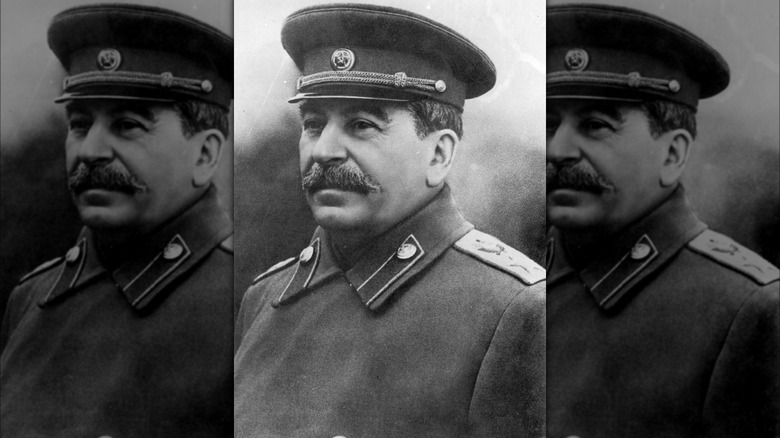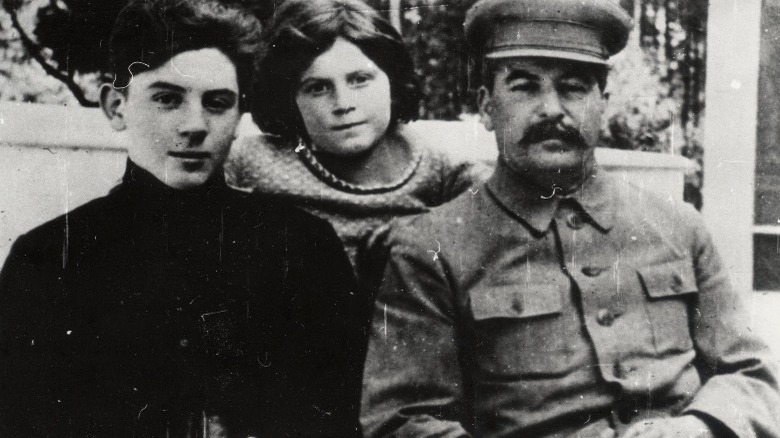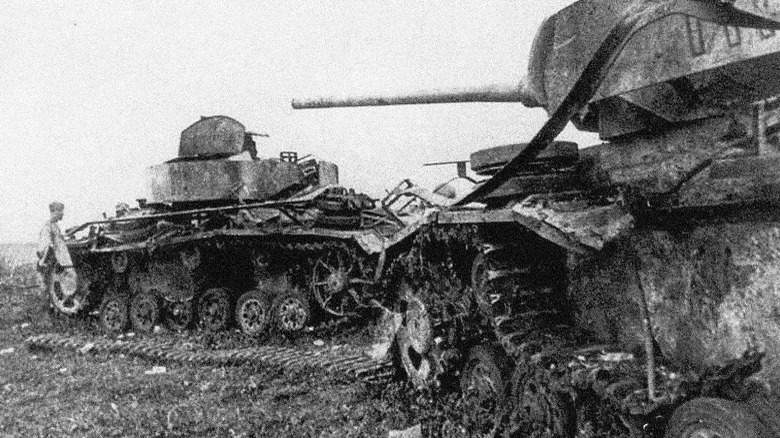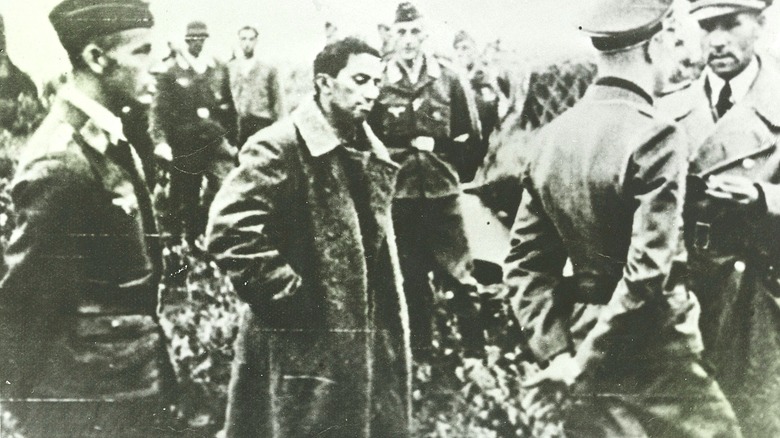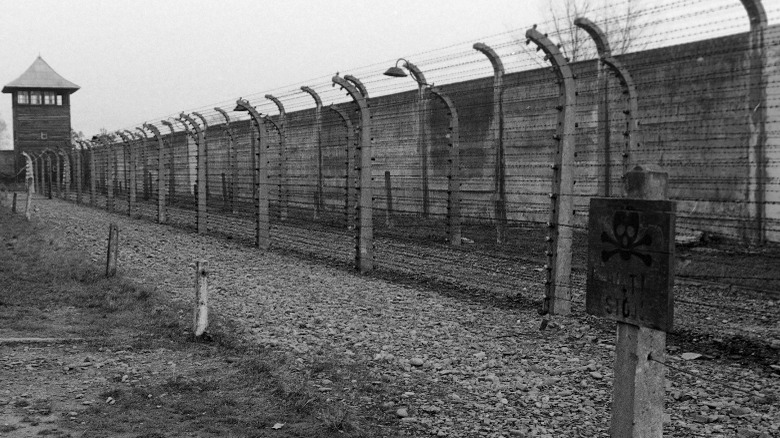The Grim Death Of Joseph Stalin's Son During World War II
When examining powerful families throughout history, many of them are centered around a traditional family structure. Generally, the father was the head of household who made the money and had the power. Often, in order to maintain their grip on this power, these men were encouraged and even expected to produce a male heir to secure the family legacy. Examples of this can be seen in monarchies like the British Royal family, where primogeniture was practiced, according to History. Because of this, having a son was usually a pretty big deal, and they could be the most protected and pressured members of these types of families.
Though this family dynamic was pretty common until as recently as the mid-20th century, there were also elite families that did not necessarily adhere to this tradition. An example of that is the relationship between Soviet dictator Joseph Stalin and his eldest son Yakov Dzhugashvili, whom he sent off to fight during World War II. Despite being from a prominent family, Stalin's son met an awful end after being captured by German forces.
Family Ties
According to Biography, Joseph Stalin was born Iosif Vissarionovich Dzhugashvili on December 18, 1878, in Gori, Georgia. The child of a washerwoman and a cobbler, Stalin's early life was not ideal as he experienced multiple health issues and was treated badly by children his age. As a young man, he was drawn to the teachings of Karl Marx and the words of Vladimir Lenin, who helped him developed his socialist political beliefs.
In 1906, Stalin married, and the couple had a son they named Yakov the following year (per History). Tragically, Stalin's wife passed away when their son was just a baby. Stalin remarried more than a decade later and had two other children with his second wife. Additionally, he had multiple children outside of his marriage. Stalin's firstborn son was not raised with the rest of his siblings but by an aunt. He did not meet his father until 1921 when he was 14 years old (per Russia Beyond).
Military Service
Though two decades had passed by the time World War II rolled around, that time did nothing to help Stalin's relationship with his eldest son. According to All That's Interesting, tensions reached a boiling point when Yakov Dzhugashvili informed his father that he was getting married. This led to an explosive confrontation between father and son, which resulted in Dzhugashvili attempting to take his own life by shooting himself. He survived the suicide attempt, but things between him and his father remained strained.
In 1941, Dzhugashvili enlisted in the Red Army Artillery Academy, and by the time he left, he was given full command of an artillery battery. Within a month of his appointment to his position, Germany began its invasion of the USSR. Dzhugashvili was originally designated as a reserve fighter, but when war came knocking, he was sent to fight. The sad part is Dzhugashvili only appears to have joined the military at the behest of his father (per Russia Beyond).
Captured
Yakov Dzhugashvili's direct participation in the war effort was a bit unusual for the time. The fact that his father was the leader of the USSR theoretically should have afforded his son some sort of protection. However, per All That's Interesting, this was not the case for Dzhugashvili, who was sent off to war with a simple phone call from his father telling him to "Go and fight!"
Though he did heed his father's request and enter the battlefield, his time there did not last very long. In July 1941, Dzhugashvili and his unit were forced to surrender to German forces in Belorussia. He did make one failed escape attempt before his identity as the son of Stalin was revealed to his captors. For once in his life, it appeared that having Stalin as a father provided Dzhugashvili with some protection since the Nazis saw this as an opportunity to negotiate.
Tense Negotiations
Following his capture, Yakov Dzhugashvili was not treated like your typical prisoner of war. The Nazis were civil in their treatment of him, even during interrogations (per All That's Interesting). It appears that Nazis tried to entice him to turn on his father and his country in order to continue pushing the narrative of the prowess of the Third Reich's war machine.
Despite best efforts, Dzhugashvili didn't crack under the pressure applied to him and remained loyal to his cause. However, Nazis put out a story to the contrary, saying Dzhugashvili surrendered willingly (per Russia Beyond). Initially, even Stalin believed this to be true about his own son and labeled him a coward. Luckily, as more information arrived back in the USSR about Dzhugashvili's circumstances, Stalin changed his mind.
All attempts to rescue Dzhugashvili resulted in failure. The Germans did ultimately offer to trade Stalin's son for the return of high-ranking military officials, but that deal was never realized.
Tragic End
Due to the unsuccessful rescue attempts and negotiations, relations between the two warring nations began to go downhill rapidly. Despite his precarious status with the Germans, Yakov Dzhugashvili remained loyal to his father's cause. Because of this, his treatment by his captors went from almost kind and respectful to harsh (per All That's Interesting). Dzhugashvili soon reached his breaking point and attempted an escape.
On April 14, 1943, Stalin's oldest son made his final bid for freedom while trying to flee from the Nazi concentration camp where he was being held. While running toward the electric fence, he reportedly shouted at a nearby guard to shoot him. The guard did so just as Dzhugashvili reached for the fence. The Nazis claimed that he was gunned down while trying to escape, but it has since been reported that it is more likely that Dzhugashvili's final maneuver was more of an act of suicide. There is speculation that he was feeling that his father had forsaken him and ended his life as a result.
Stalin reportedly knew that his son had been shot, but not when, where, or why. In 1945, the details surrounding Dzhugashvili's death were discovered by British intelligence. It was decided to keep the gruesome details from Stalin to spare him the pain of learning his son's fate.
